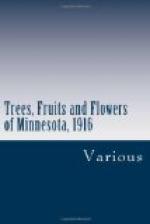[Illustration: Carnege library and flower beds at N.D. Agricultural College, Fargo.]
It will be seen that while there is no question as to the fact of varieties running out, that they differ a great deal in this respect, and it is only through a knowledge of the facts covering each variety, or at least the varieties of each species, that would enable a grower to know what to do in order to keep a variety up to the highest standard.
Mr. Kellogg: What is the matter with the old Wilson strawberry?
Mr. Waldron: I think people forgot about it and began growing better varieties. I know there is an impression among strawberry growers that the Wilson strawberry has run out. I don’t know. I know it has been supplanted by other varieties, and the general impression of most men is that it is because other varieties, better varieties, came in and that variety was neglected.
Mr. Kellogg: It can be found in eastern catalogs now.
Mr. Waldron: Isn’t it as good now as it was?
Mr. Kellogg: That is what I want to know.
Mr. Waldron: I understand that it is from the people that have grown them. I don’t know of any strawberry in my career from the first time that I have been working in strawberries that seems to be any poorer now than it was twenty-five or thirty years ago. The Wilson might be an exception. I know that has been referred to as an instance of deterioration of variety. The strawberry might be so dependent on climatic and soil conditions that it might be classed with the potatoes and not be in a class with the apples, which don’t seem to deteriorate.
Mr. Kellogg: Is there such a thing as a pedigreed strawberry plant that is taken from runners?
Mr. Waldron: We have experiments going on at the agricultural college now. We set out a number of plants from strawberry growers that advertise a pedigreed strawberry, and beside those we have strawberry plants from growers who don’t advertise them as pedigreed. This year we ought to get some returns on that; last year the patch was flooded out—we had very heavy June rains. We have about ten varieties from a large number of different growers, some supposed to be perfect and some not. We are going to have some report of them at the next horticultural meeting. I don’t believe there is anything much in pedigreed strawberries.
The President: In the state of North Dakota our friend here who has just spoken occupies the same position in the hearts and minds of the people of his state as do our friends Haralson, Hansen and Patten in this section. His work is along a little different line, his being almost purely an agricultural section, but he is a very practical man and is doing splendid work up there.




